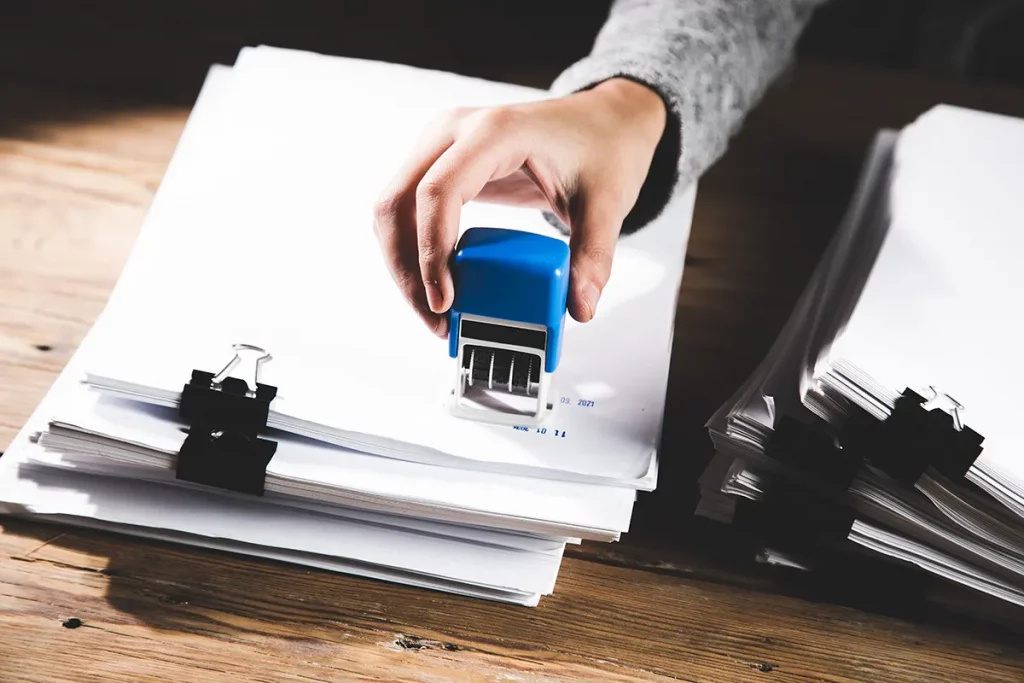Is Notarizing for Relatives Permitted?
If a relative asks you to notarize a document, the first thing to do is check your state’s law. A few states prohibit notaries from notarizing for relatives but some allow it, so check with your state’s laws.
If your state allows notarizing for relatives, remember that you still have to follow all of the standard legal rules and guidelines for identifying the signer and completing the notarization.

The family member must appear in person in front of you, the Notary, and have their identity verified. If your state requires a journal entry, the relative will then need to sign the journal entry for notarization. Even if the relative is a spouse or child in the same household, the above standards still apply.
It is important to remember this can sometimes put Notaries in an uncomfortable position, both legally and emotionally. It is ultimately up to you as a Notary Public to decide whether or not to accept the request.
If you do decide to proceed with the notarization, make sure the relative understands that you cannot provide legal advice or guidance on any matter relating to the document they are signing. The best practice would be to recommend they seek out their own independent legal counsel before proceeding, if necessary.
When it comes down to it, being honest and following your state’s laws when performing a notarization for a relative will help protect you as a Notary from potential legal issues. So, make sure you know your state’s laws and do what is best for the situation.
Reasons to Decline Notarizing for Relatives
If you live in a state, like New York state, that allows notarizations for a relative, you’ll also want to make sure that you’re not named in the document and won’t receive any financial benefit from the transaction. If you have any involvement in the document at all, it’s best to decline to notarize and recommend the relative to a different Notary. This should also be flagged if your spouse asks you to verify their signature. If you could benefit from a transaction in any way, it’s best to have another Notary validate the document.
If you notarize a document in which you would knowingly receive a financial benefit, and it’s prohibited under your state law, that could be a violation of the Notary Public Code of Professional Responsibility. You could incur fines and face severe penalties, or have legal action brought against you, and maybe even lose your notary license. And, that wouldn’t be covered under your bond insurance or errors and omissions insurance, especially if the act was intentionally permitted. So, it’s best to opt-out of that kind of transaction.
It’s also important to decline notarizations when your relative is signing a document that requires them to make personal guarantees or commitments. You can’t advise them on the terms of their agreement, and it could leave you open to liability if there are any issues down the road. The best thing for you and your relative is to find a different Notary who can recommend legal advice.
For these reasons, it’s important that you understand what types of documents are prohibited by law and how they could impact both you and your relative. Knowing this information will help ensure that you make decisions that protect both you and your relative from potentially costly problems in the future. So, if there’s ever any question, it’s best to decline the notarization and make a referral. Knowing when to say “no” is an important part of being a responsible Notary Public.
How to Record a Family Member Notarization in Your Journal
If your state allows you to notarize a relative’s document, the notarization is recorded in your journal the same way you would record a notarization for a non-relative. First, the relative is required to appear in person with their document. If your state allows “personally known to me” as an option to verify the relative’s identity, you can select this option in your journal or make a note of this identity type.

If you don’t have this option, make sure the signer brings valid identification and records this information in your journal. Second, you should record the location and date of notarization, the type of notarization, the signature fee (if you are collecting one), and lastly, have the relative sign the journal entry. Again, as long as your state allows for notarizations for a relative, be sure to scan the entire document to be notarized and ensure that you have no benefit gain or are named in the document.
Most importantly, always follow the rules and your state laws. Don’t be afraid to ask questions if you are unsure whether notarizing for relatives member is permitted. Always check your state laws or contact the NNA hotline if you are a member.
The most important thing is to protect yourself and maintain the integrity of your notary journal.
Finally, it’s helpful to have a clear policy when it comes to notarizing for relatives. It can save you time, money and headache in the future if everyone understands the rules ahead of time. Be sure to communicate your expectations clearly and document any conversations related to family member notarizations in your journal. This will help you stay organized and provide evidence of sound ethical practices.
Another notary signing that may raise questions as a notary is whether or not you can notarize a minor’s signature. We answer that question in our article, Can you notarize a Minor’s signature.

Kim Jones
Notary Roc City Notary Services
Kim Jones is a veteran mobile Notary and Notary Signing Agent with over 15 years of experience. Kim is the Owner and Operator of Roc City Notary Services in upstate NY.
Notary Jane: Kim Jones
Instagram: @roccitynotary
Website: RocCityNotary.com

